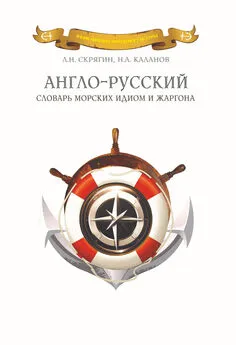Adam Makkai - Словарь американских идиом: 8000 единиц
- Название:Словарь американских идиом: 8000 единиц
- Автор:
- Жанр:
- Издательство:неизвестно
- Год:неизвестен
- ISBN:нет данных
- Рейтинг:
- Избранное:Добавить в избранное
-
Отзывы:
-
Ваша оценка:
Adam Makkai - Словарь американских идиом: 8000 единиц краткое содержание
Это обновленное и дополненное издание, содержащее более 8000 идиоматических
слов и выражений, причем каждое из которых снабжено грамматическим объяснением
и практическим примером. Словарь содержит лексемные идиомы, фразеологические
единицы и поговорки, имеющие особенное значение. В нем приведены наиболее
употребительные выражения только американского английского языка. Этот словарь — идеальное пособие для студентов, часто разъезжающих бизнесменов и просто
путешественников.
Словарь американских идиом: 8000 единиц - читать онлайн бесплатно полную версию (весь текст целиком)
Интервал:
Закладка:
[cash in on] {v.} , {informal} To see (a chance) and profit by it; take advantage of (an opportunity or happening). •/ Mr. Brown cashed in on people’s great interest in camping and sold three hundred tents. /
[cash on the barrelhead] {n. phr.} , {informal} Money paid at once; money paid when something is bought. •/ Father paid cash on the barrelhead for a new car. / •/ Some lawyers want cash on the barrelhead. / Compare: COLD CASH.
[cast]or [shed]or [throw light upon] {v. phr.} To explain; illuminate; clarify. •/ The letters that were found suddenly cast a new light on the circumstances of Tom’s disappearance. / •/ Einstein’s General Theory of Relativity threw light upon the enigma of our universe. /
[cast about]also [cast around] {v.} , {literary} 1. To look everywhere; search. •/ The committee was casting about for an experienced teacher to take the retiring principal’s place. / 2. To search your mind; try to remember something; try to think of something. •/ The teacher cast about for an easy way to explain the lesson. / •/ Jane cast around for a good subject for her report. /
[cast down] {adj.} Discouraged; sad; unhappy. — Used less often than the reverse form, "downcast". •/ Mary was cast down at the news of her uncle’s death. / •/ Charles felt cast down when he lost the race. /
[cast in one’s lot with] {formal} See: THROW IN ONE’S LOT WITH.
[castle in the air]See: BUILD CASTLES IN THE AIR.
[castles in Spain]See: CASTLES IN THE AIR.
[cast off] {v.} 1a. or [cast loose]To unfasten; untie; let loose (as a rope holding a boat). •/ The captain of the boat cast off the line and we were soon out in open water. / 1b. To untie a rope holding a boat or something suggesting a boat. •/ We cast off and set sail at 6 A.M. / 2. To knit the last row of stitches. •/ When she had knitted the twentieth row of stitches she cast off. / 3. To say that you do not know (someone) any more; not accept as a relative or friend. •/ Mr. Jones cast off his daughter when she married against his wishes. /
[cast one’s lot with]See: THROW IN ONE’S LOT WITH.
[cast out] {v.} , {formal} To force (someone) to go out or away; banish; expel. •/ After the scandal, he was cast out of the best society. / Compare: CAST OFF(3).
[cast pearls before swine]or [cast one’s pearls before swine] {n. phr.} , {literary} To waste good acts or valuable things on someone who won’t understand or be thankful for them, just as pigs won’t appreciate pearls. — Often used in negative sentences. •/ I won’t waste good advice on John any more because he never listens to it. I won’t cast pearls before swine. /
[cast the first stone] {v. phr.} , {literary} To be the first to blame someone, lead accusers against a wrongdoer. •/ Jesus said that a person who was without sin could cast the first stone. / •/ Although Ben saw the girl cheating, he did not want to cast the first stone. /
[cast up] {v.} , {literary} 1. To turn or direct upward; raise. •/ The dying missionary cast up his eyes to heaven and prayed. / 2. {archaic} To do sums; do a problem in addition; add. •/ Cast up 15, 43, 27, and 18. / •/ When John had all the figures, he cast them up. /
[cat]See: COPY CAT, CURIOSITY KILLED THE CAT, FRAIDY-CAT or FRAID-CAT or SCAREDY CAT OY SCARED-CAT, HOLY CATS, LET THE CAT OUT OF THE BAG, LOOK LIKE THE CAT THAT ATE THE CANARY, PLAY CAT AND MOUSE WITH, RAIN CATS AND DOGS.
[catch]See: EARLY BIRD CATCHES THE WORM, FAIR CATCH, SHOESTRING CATCH.
[catch-as-catch-can(1)] {adv. phr.} In a free manner; in any way possible; in the best way you can. •/ On moving day everything is packed and we eat meals catch-as-catch-can. /
[catch-as-catch-can(2)] {adj. phr.} Using any means or method; unplanned; free. •/ Rip van Winkle seems to have led a catch-as-catch-can life. / •/ Politics is rather a catch-as-catch-can business. / Compare: HIT-OR-MISS.
[catch at] {v.} 1. To try to catch suddenly; grab for. •/ The boy on the merry-go-round caught at the brass ring, but did not get it. / 2. To seize quickly; accept mentally or physically. •/ The hungry man caught at the sandwich and began to eat. / •/ Joe caught at Bill’s offer to help. /
[catch at a straw]See: GRASP AT STRAWS.
[catch cold] {v. phr.} 1. or [take cold]To get a common cold-weather sickness that causes a running nose, sneezing, and sometimes sore throat and fever or other symptoms. •/ Don’t get your feet wet or you’ll catch cold. / 2. {informal} To catch unprepared or not ready for a question or unexpected happening. •/ I had not studied my lesson carefully, and the teacher’s question caught me cold. / •/ The opposing team was big and sure of winning, and they were caught cold by the fast, hard playing of our smaller players. /
[catch (someone) dead] {v. phr.} , {informal} To see or hear (someone) in an embarrassing act or place at any time. Used in the negative usually in the passive. •/ You won’t catch Bill dead taking his sister to the movies. / •/ John wouldn’t be caught dead in the necktie he got for Christmas. /
[catch fire] {v. phr.} 1. To begin to burn. •/ When he dropped a match in the leaves, they caught fire. / 2. To become excited. •/ The audience caught fire at the speaker’s words and began to cheer. / •/ His imagination caught fire as he read. /
[catch flat-footed]See: FLAT-FOOTED(2).
[catch forty winks]See: FORTY WINKS.
[catch hold of] {v. phr.} To grasp a person or a thing. •/ "I’ve been trying to catch hold of you all week," John said, "but you were out of town." / •/ The mountain climber successfully caught hold of his friend’s hand and thereby saved his life. /
[catch it]or [get it] {v. phr.} , {informal} To be scolded or punished. — Usually used of children. •/ John knew he would catch it when he came home late for supper. / •/ Wow, Johnny! When your mother sees those torn pants, you’re going to get it. / Compare: GET WHAT’S COMING TO ONE. Contrast: GIVE IT TO(2).
[catch it in the neck]or [get it in the neck] {v. phr.} , {slang} To be blamed or punished. •/ Tom got it in the neck because he forgot to close the windows when it rained. / •/ Students get it in the neck when they lose library books. / Compare: CATCH IT, GET WHAT’S COMING TO ONE.
[catch off balance] {v. phr.} To confront someone with physical force or with a statement or question he or she is not prepared to answer or deal with; to exploit the disadvantage of another. •/ The smaller wrestler caught his opponent off balance and managed to throw him on the float in spite of his greater weight and strength. / •/ Your question has caught me off balance; please give me some time to think about your problem. /
[catch off guard] {v. phr.} To challenge or confront a person at a time of lack of preparedness or sufficient care. •/ The suspect was caught off guard by the detective and confessed where he had hidden the stolen car. /
[catch on] {v.} , {informal} 1. To understand; learn about. — Often used with "to". •/ You’ll catch on to the job after you’ve been here awhile. / •/ Don’t play any tricks on Joe. When he catches on, he will beat you. / 2. To become popular; be done or used by many people. •/ The song caught on and was sung and played everywhere. / 3. To be hired; get a job. •/ The ball player caught on with a big league team last year. /
[catch one’s breath] {v. phr.} 1. To breathe in suddenly with fear or surprise. •/ The beauty of the scene made him catch his breath. / Compare: TAKE ONE’S BREATH AWAY. 2a. To rest and get back your normal breathing, as after running. •/ After running to the bus stop, we sat down to catch our breath. / 2b. To relax for a moment after any work. •/ After the day’s work we sat down over coffee to catch our breath. /
[catch one’s death of]or [take one’s death of] {v. phr.} , {informal} To become very ill with (a cold, pneumonia, flu). •/ Johnny fell in the icy water and almost took his death of cold. / Sometimes used in the short form "catch your death." •/ "Johnny! Come right in here and put your coat and hat on. You’ll catch your death!" /
[catch one’s eye] {v. phr.} To attract your attention. •/ I caught his eye as he moved through the crowd, and waved at him to come over. / •/ The dress in the window caught her eye when she passed the store. /
[catch red-handed] {v. phr.} /To apprehend a person during the act of committing an illicit or criminal act./ •/ Al was caught red-handed at the local store when he was trying to walk out with a new camera he had not paid for. /
[catch sight of] {v. phr.} To see suddenly or unexpectedly. •/ Allan caught sight of a kingbird in a maple tree. / Contrast: LOSE SIGHT OF.
[catch some rays] {v. phr.} , {slang} , {informal} To get tanned while sunbathing. •/ Tomorrow I’ll go to the beach and try to catch some rays. /
[catch some Z’s] {v. phr.} , {slang} , {informal} To take a nap, to go to sleep. (Because of the "z" sound resembling snoring.) •/ I want to hit the sack and catch some Z’s. /
[catch-22] {n.} , {informal} From Joseph Heller’s novel "Catch-22", set in World War II. 1. A regulation or situation that is self-contradictory or that conflicts with another regulation. In Heller’s book it referred to the regulation that flight crews must report for duty unless excused for reasons of insanity, but that any one claiming such an excuse must, by definition, be sane. •/ Government rules require workers to expose any wrongdoing in their office, but the Catch-22 prevents them from their doing so, because they are not allowed to disclose any information about their work. / 2. A paradoxical situation. •/ The Catch-22 of job-hunting was that the factory wanted to hire only workers who had experience making computers but the only way to get the experience was by working at the computer factory. /
[catch up] {v.} 1. To take or pick up suddenly; grab (something). •/ She caught up the book from the table and ran out of the room. / 2. To capture or trap (someone) in a situation; concern or interest very much. — Usually used in the passive with "in". •/ The Smith family was caught up in the war in Europe and we did not see them again till it was over. / •/ We were so caught up in the movie we forgot what time it was. / Compare: MIX UP. 3. To go fast enough or do enough so as not to be behind; overtake; come even. — Often used with "to" or "with". •/ Johnny ran hard and tried to catch up to his friends. / •/ Mary missed two weeks of school; she must work hard to catch up with her class. / Compare: UP TO. 4. To find out about or get proof to punish or arrest. — Usually used with "with". •/ A man told the police where the robbers were hiding, so the police finally caught up with them. / 5. To result in something bad; bring punishment. — Usually used with "with". •/ The boy’s fighting caught up with him and he was expelled from school. / •/ Smoking will catch up with you. / Compare: CHICKENS COME HOME TO ROOST. 6. To finish; not lose or be behind. — Used with "on" and often in the phrase "get caught up on". •/ Frank stayed up late to get caught up on his homework. / •/ I have to catch up on my sleep. / •/ We caught up on all the latest news when we got back to school and saw our friends again. / Syn.: KEEP UP.
Читать дальшеИнтервал:
Закладка:







